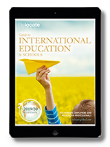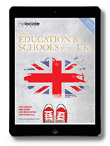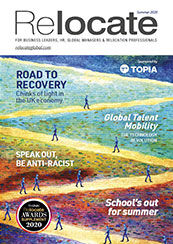Schools out for summer
School summer holidays fill working parents with fear. This summer is no exception. Covid-19 is scuppering even the best-laid plans for childcare and the school return in the peak moving and relocation season, writes Ruth Holmes.

Click on the cover to access the digital edition or read all of the articles on our website.
School’s been out for many at least since February. With more local lockdowns likely while restrictions elsewhere are lifting, planning for the next few months is going to be hard for international schools, parents and students; especially those preparing for new school starts, GCSEs, IB and A Levels, entrance examinations and 11+ assessments.In the context of advice of economists like Professor Andrew Scott of London Business School, businesses and employers need to prepare for post-lockdown bounce-back and the sharp, if patchy, recovery of demand and increased workload this will bring.Employers and parents are therefore looking to find solutions to support globally mobile parents’ productivity, relocation plans and family wellbeing.
Online learning
According to UNESCO, coronavirus has disrupted the learning lives of 1.7 billion children and young people across the globe. Online distance-learning has been crucial to continuing education for many through online portals and platforms like Blackboard and Schoology, or with more mainstream tools like Microsoft Teams, Google Hangout or Zoom.The Global Education Practice of management consultants, LEK Consultants, recently published research and guidance for education providers looking to enhance or benchmark their practices. As well as offering useful insight for employers and parents, it will no doubt be useful for educators to assess their approaches to-date over the summer.LEK’s report identifies four key functions of virtual education operations:- academic services
- non-academic activities
- psychological support
- communication with parents and students.
Catching up after Covid-19
As well as the practicalities of learning methods, another key concern for parents and students is catching up on any missed curriculum and enrichment activities. While every day is a school day and a lot of learning happens outside the classroom – particularly for families on international assignments – Covid-19 is putting paid to learning as usual, despite the positive developments in virtual learning.Beatrice McKechnie-Rowe, managing director of Enjoy Education, winners of Relocate’s Excellence in Education Consultancy/Support, is concerned about how the pandemic will mean some students are going to fall behind. “We are very concerned about the rapidly widening gap in learning for students due to school closures,” says Beatrice. “We know this will impact students from disadvantaged backgrounds most and we’re liaising with the national government tuition programme to understand how we can help most.“Many schools have done an excellent job of transitioning learning online quickly. However, lessons have understandably been pitched at the mid-level student in the class,” she continues. “We were aware from the outset that it would be those students with SEN, who need more support, or the gifted and talented students that would likely be disadvantaged. We have heard from many parents with children who would benefit from a more tailored approach than provided.”The cancellation of the UK’s summer examination schedule is also causing parents and educators concern. “In the UK, we anticipate many students choosing to resit GCSEs and A-levels in the autumn following grades this summer. Having a good learning strategy is key here so that students don’t feel overwhelmed and can focus on key subjects and content,” says Beatrice. “Supporting students with their curriculum-content learning will ensure they maintain the necessary time for revision and exam practice later on in the year, which we know are integral to exam success.“Families are coming to us for an academic assessment so they can understand their child’s current level and identify if there is a gap and working with tutors over the summer to ensure their children can start school in September feeling confident and on the front foot.”
“We are very concerned about the rapidly widening gap in learning for students due to school closures,” says Beatrice. “We know this will impact students from disadvantaged backgrounds most and we’re liaising with the national government tuition programme to understand how we can help most.“Many schools have done an excellent job of transitioning learning online quickly. However, lessons have understandably been pitched at the mid-level student in the class,” she continues. “We were aware from the outset that it would be those students with SEN, who need more support, or the gifted and talented students that would likely be disadvantaged. We have heard from many parents with children who would benefit from a more tailored approach than provided.”The cancellation of the UK’s summer examination schedule is also causing parents and educators concern. “In the UK, we anticipate many students choosing to resit GCSEs and A-levels in the autumn following grades this summer. Having a good learning strategy is key here so that students don’t feel overwhelmed and can focus on key subjects and content,” says Beatrice. “Supporting students with their curriculum-content learning will ensure they maintain the necessary time for revision and exam practice later on in the year, which we know are integral to exam success.“Families are coming to us for an academic assessment so they can understand their child’s current level and identify if there is a gap and working with tutors over the summer to ensure their children can start school in September feeling confident and on the front foot.”Virtual summer camps and programmes during Covid-19
For families opting or compelled to remain abroad, Enjoy Education’s home-schooling team is setting up programmes for international clients for the autumn term. This is helping to keep children’s learning on a par with their school peers. “Families are also using the opportunity to build in creative subjects, skills- based learning and project learning that a one-on-one programme allows for,” says Beatrice.Creative and enrichment activities also support academic learning. Sarah Travis, senior associate director of Student Recruitment and Admissions at TASIS, oversees the group’s award-winning Summer School Programme, which has run for 40 years.Anticipating that Covid-related travel restrictions would prevent students from gathering on the School’s beautiful 46-acre campus close to London, the team has designed an exciting range of online courses for young people aged 11 to 17.“This summer, we are delighted to bring education to students around the world by offering a wide variety of online courses, including EAL, STEM, IB revision, SAT test prep, fashion and textile design, and Leadership Academy,” said Sarah. “Our online courses supported by our highly qualified and experienced teachers allow students of various nationalities to study alongside each other, improving their knowledge and skills while also having great fun.”Highlighting the wellbeing concerns for children and young adults during and after lockdown, Sarah says, “It has never been more important to provide opportunities for young people to be proactive and engaged.”Value of a bilingual education
The lockdown is also a great opportunity to prepare for an international relocation, especially where the national or business language is not English. Many parents working in an international environment are particularly keen to ensure their child is bilingual. At EIFA International School in London, children from nursery to senior school are taught in a bilingual environment in French and English.Head of school, Françoise Zurbach, says “an important message to come out ofthe coronavirus pandemic is that we are all connected across the world and that kindness and understanding matter. Most parents would agree that it is important for our children to grow up a global citizens that are open and accepting of different cultures. This must start with language. It is language that frames our lives and by being bilingual we gain an insight into other cultures.”Preparing for uncertainty in the Autumn return
With parents in the UK told in early July by the government pupils must return to school in September, how are international schools facilitating a smooth return and supporting students’ transition back into school, and possibly a new school and a new country?At International Education Systems’ The Grantham International Preparatory School in the UK, the autumn term return should see the school operate largely as it is now if the local and national rates of Covid-19 infections remain low. “We are a relatively small school and 96% of our children have been back with us since June 15,” says headteacher Kathryn Korcz. “We hope to be able to continue in the same, safe way following government guidelines and keeping school years and teaching staff in small bubbles.”Following government advice and adhering to social distancing protocols, the school has fortunately been able to show prospective families around the school. New joiners in September will also be able to start to make their transitions during July. For children moving up into their next stage of the education in the autumn, Zoom and other virtual conferencing platforms have been invaluable in place of school visits for induction days.Oakham SchoolOakham School, a UK independent boarding and day school in Rutland for 11-18 year-olds, is among those using this approach to support families and introduce students to each other before they meet in person. “This is incredibly important to help them to settle in, to be confident and happy,” says Sarah Gomm, deputy head (pastoral) at Oakham.Many boarding schools, like Oakham, have also signed up to and are committed to upholding the Boarding Schools’ Association (BSA) COVID-Safe Charter. This outlines the standards schools should adhere to in order to ensure the highest level of care for each and every child.“Parents could look to see if their school or the school they are considering has signed up to this,” says Sarah Gomm. “We at Oakham School have gone even further, implementing a series ofmeasures we hope will provide even more reassurance to all of our international families.“If quarantines are in place, parents should ask their school how this will be managed. At Oakham pupils can undertake the quarantine in school, cared for by house staffwith a small ‘arrival group’, and follow a distance-learning timetable while settling intotheroutinesofschoollife.“We have been urging all of our international parents to talk with us, to share any concerns they may have, so that we can reassure them of all the plans we have in place to keep our pupils safe and, importantly, happy and able to learn. We strongly suggest that all parents do this with their school.“Parents perhaps need also to consider their plans for October half-term; whether their children will, or will be able to, return home – or if, like Oakham, pupils are able to stay and be cared for and take part in study sessions and activities.”The Garden International School
The Garden International School (GIS), Kuala Lumpur, won this year’s Relocate Award for School Providing Outstanding Relocation Support. GIS has continued to excel during Malaysia’s recent Movement Control Order period, as Annaleen Erlingen of GIS explains.“We have introduced a host of new learning methods, styles and classes that benefit our whole community. Our Continuous Learning provision combines both online and offline approaches to learning. This ensures we take a measured approach to teaching dependent on the type of lesson and age ofthe student, but always with our students’ wellbeing at heart.“Learning is a balance of tasks to ensure plenty of interaction with the teacher and classmates, but also much-needed time away from devices. Teachers give regular feedback to check for understanding and support learner progress. We also emphasise personalised learning to ensure teaching and learning experiences inspire, motivate and challenge all our students.“We understand that for many parents the current MCO (movement control order) and closure ofschools has not been a walk in the park! Juggling multiple hats such as parenting, career and household responsibilities in such close quarters is enough for everyone to feel the pressure. A happy family starts with happy parents. That’s why at GIS, we wanted to give something useful back to parents.”GIS is focusing heavily on parents’ wellbeing using the mantra “me time = better we time”. Uplifting sessions on a broad range of topics and community forums for top-tip sharing sit alongside weekly parent workshops on academic aspects, including how to make a timetable and support your children when learning online.GIS is continuing its support over the summer by offering free and inspiring sessions for children and their parents to help reconnect with favourite hobbies or try out new skills.Access the Education Guide eBooks

Guide to International Education & Schools 2019/20 eBook – OUT NOW £4.99 (ISBN 978-0-9957288-8-2)
Download from Amazon or Kobo.

Guide to Education & Schools in the UK 2019/20 eBook – OUT NOW £4.99 (ISBN 978-0-9957288-9-9)
Download from Amazon or Kobo.
For advertising enquiries across the Relocate media, call +44 (0)1892 891334, or email ads@relocatemagazine.com.Let us know if you have ideas for features, surveys or events, and keep us informed of your company’s news by emailing editorial@relocatemagazine.com.Subscribe to Relocate Extra, our monthly newsletter, to get all the latest international assignments and global mobility news.Relocate’s new Global Mobility Toolkit provides free information, practical advice and support for HR, global mobility managers and global teams operating overseas.
 Access hundreds of global services and suppliers in our Online Directory
Access hundreds of global services and suppliers in our Online Directory
©2026 Re:locate magazine, published by Profile Locations, Spray Hill, Hastings Road, Lamberhurst, Kent TN3 8JB. All rights reserved. This publication (or any part thereof) may not be reproduced in any form without the prior written permission of Profile Locations. Profile Locations accepts no liability for the accuracy of the contents or any opinions expressed herein.

























